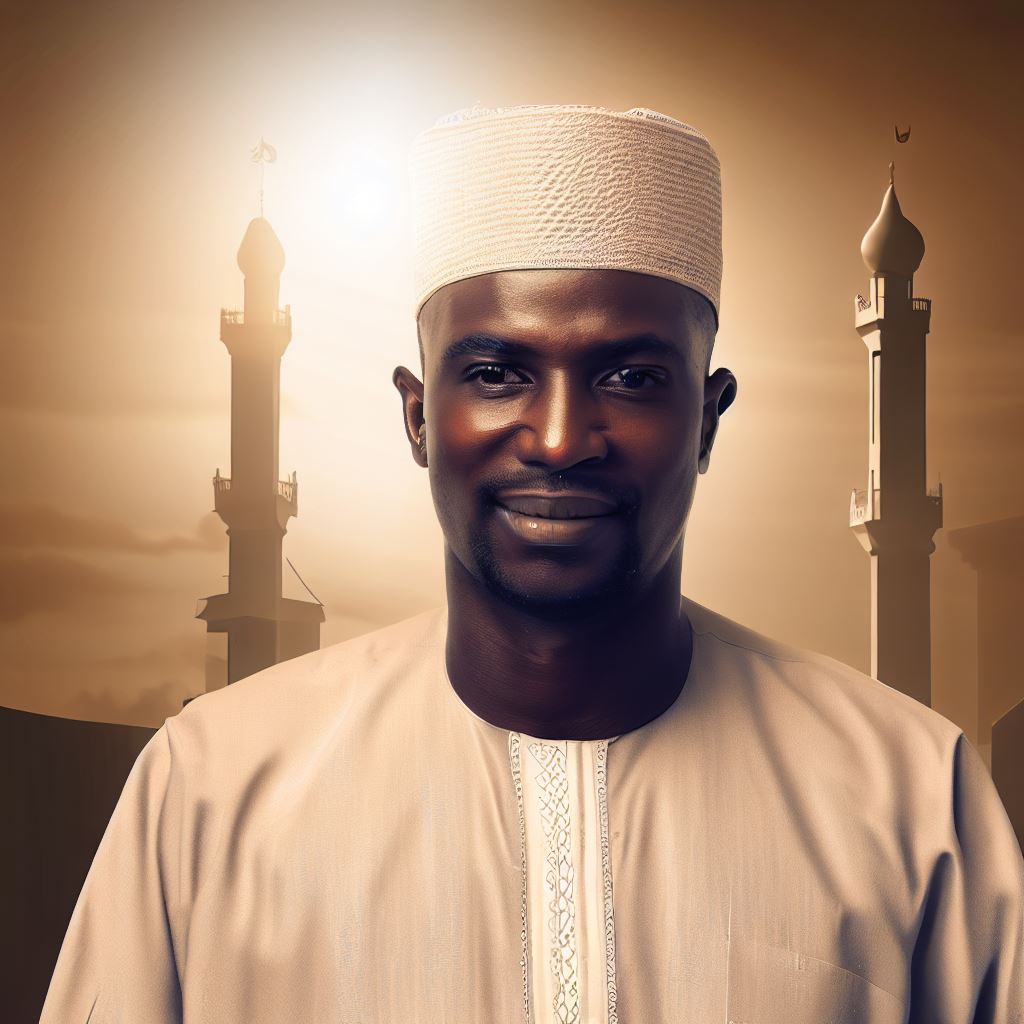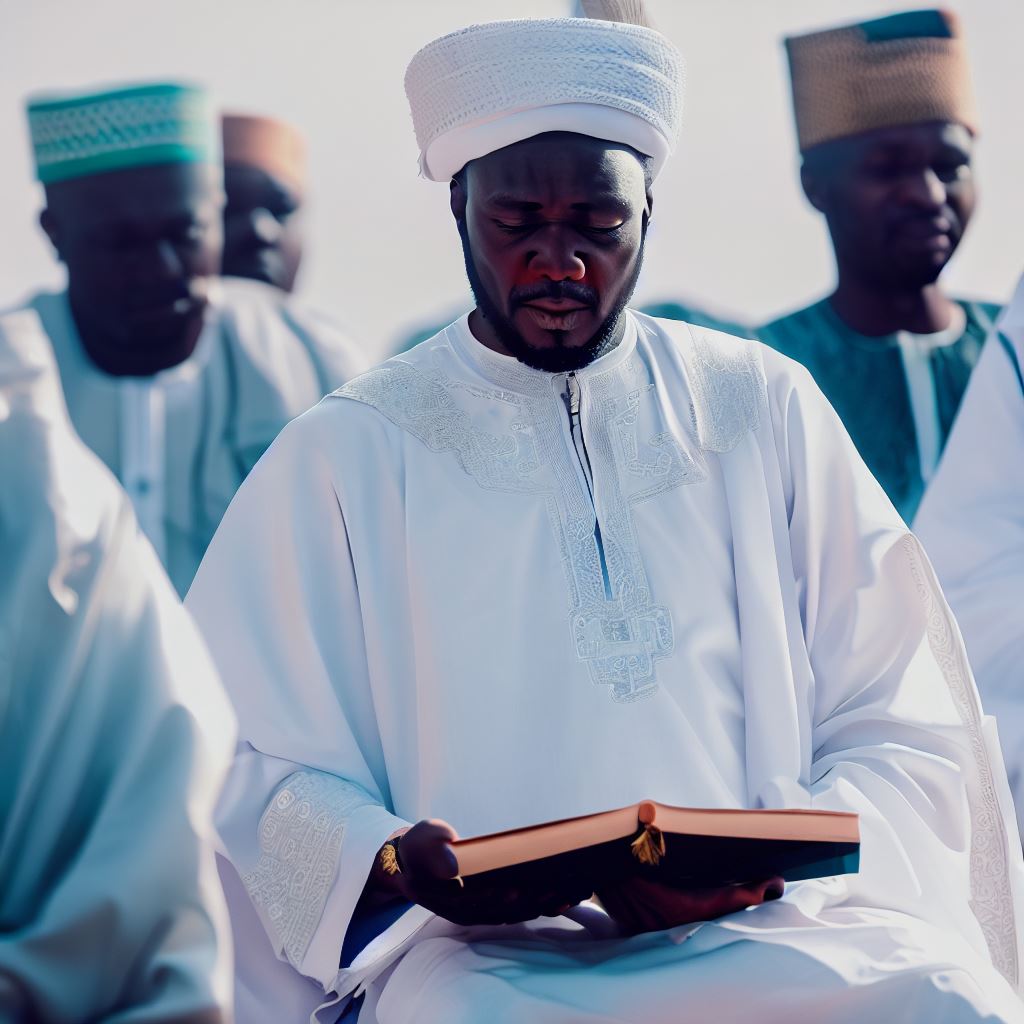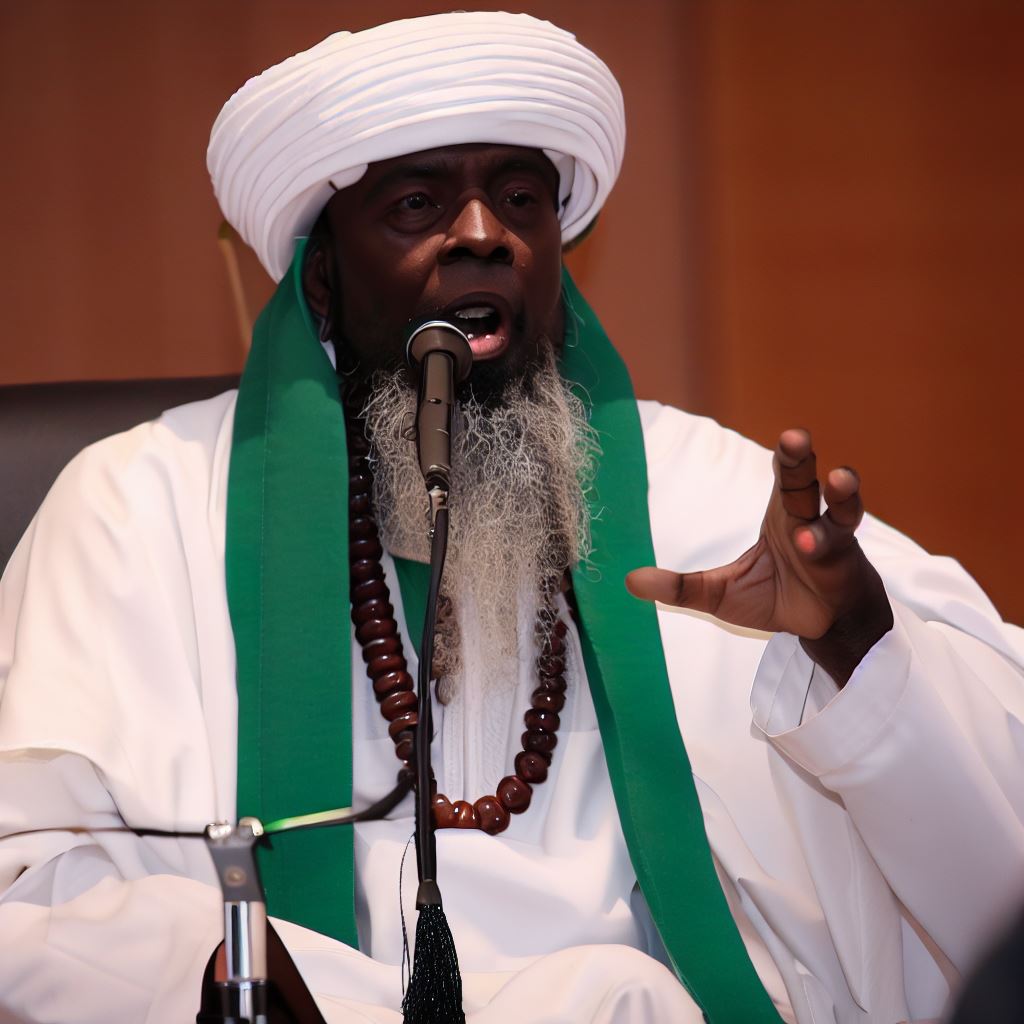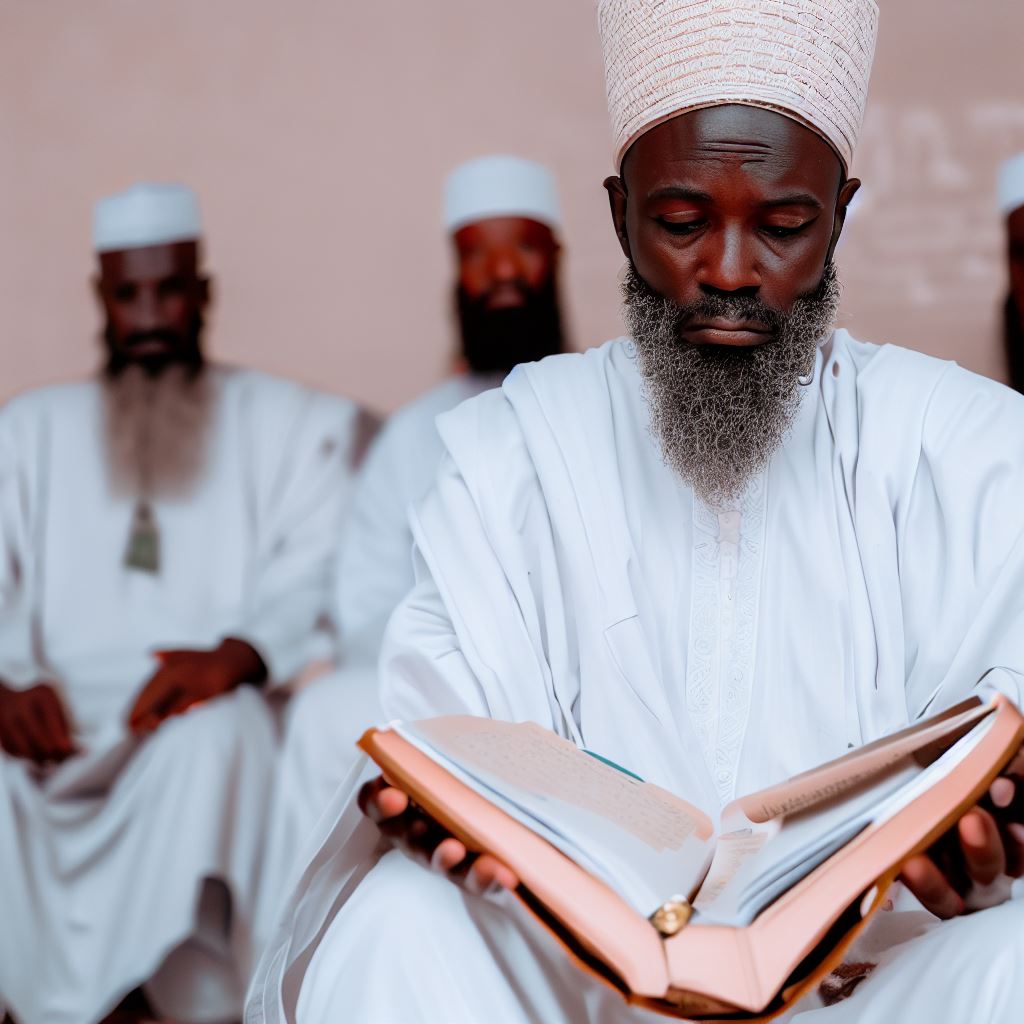Introduction
Mosques and imams hold great significance in Nigeria, representing the country’s strong Islamic heritage.
Highlighting Nigeria’s leading mosques and influential imams is crucial to illuminate their societal contributions and influence.
Mosques and imams are integral parts of Nigeria’s cultural and religious identity. With a population of over 200 million, Nigeria is home to a significant Muslim community.
Mosques serve as sacred places of worship for Muslims, enabling them to congregate, pray, and seek spiritual guidance.
Imams, as the spiritual leaders of these mosques, hold immense influence over their communities.
Highlighting the leading mosques and imams in Nigeria allows us to recognize their contributions to society and Islam.
These charismatic leaders play various roles, acting as religious guides, social advocates, and community organizers.
They maintain a vital connection between the people and their faith, offering support, guidance, and teaching.
The National Mosque in Abuja and the Sultan Bello Mosque in Sokoto, both exhibit architectural brilliance and religious significance.
These mosques serve as symbols of unity, bringing people from diverse backgrounds together in worship.
The imams, through their sermons and teachings, address social issues, promote education, and encourage charitable activities.
They play a crucial role in promoting peace, tolerance, and understanding within the Muslim community and beyond.
By recognizing and highlighting their work, we can appreciate the positive impact these imams have on society.
In essence, the mosques and imams in Nigeria hold immense significance in the country’s cultural and religious fabric.
Acknowledging their contributions and understanding the role they play in shaping communities requires highlighting the leading mosques and imams.
These individuals serve as spiritual guides and pillars of support, promoting peace and social welfare.
Historical Overview of Mosques in Nigeria
Introduction and Spread of Islam in Nigeria
Islam was introduced to Nigeria in the 11th century through the trans-Saharan trade route.
Arab traders brought the religion to the northern regions of the country, spreading its teachings among the local population. The early converts were mainly rulers and elites who saw the benefits of adopting Islam.
The Kanem-Borno Empire played a crucial role in actively spreading Islam from the north to other parts of Nigeria.
Between the 9th and 19th centuries, the empire actively established Islam as its official religion and integrated it into diverse communities.
Early Development of Mosques in the Country
As Islam gained ground in Nigeria, mosques started to emerge as centers of worship and community gathering.
These early mosques were often simple structures, built with mud and thatched roofs. They served as focal points for religious activities and played a significant role in Islamic education.
The city of Kano played a pivotal role in the development of mosques in Nigeria.
It became a hub for the construction of large and architecturally elaborate mosques, reflecting the growing importance of Islam in the region.
These mosques showcased intricate designs and unique architectural styles, becoming iconic symbols of religious devotion.
Prominence of Mosques in Nigerian Communities
Today, mosques hold a prominent place in Nigerian communities, serving as not just places of worship but also as cultural and social centers.
They provide spaces for Muslims to gather for prayer, religious instruction, and communal activities.
Mosques in Nigeria often serve as community development centers, providing services beyond religious activities.
They may offer educational programs, healthcare services, and facilitate social welfare initiatives.
These initiatives highlight the crucial role mosques play in addressing social issues and promoting community development.
Furthermore, mosques also serve as platforms for community engagement and interfaith dialogue.
They foster unity among Muslims by providing spaces for exchanging ideas, discussing community issues, and making collective decisions.
In fact, Islam was introduced to Nigeria through Arab traders, and its spread led to the emergence of mosques as centers of worship and community gathering.
The early development of mosques in Nigeria, especially in cities like Kano, showcased unique architectural styles and designs.
Today, mosques hold a prominent place in Nigerian communities, providing spaces for prayer, education, and various community initiatives.
They play a crucial role in promoting social welfare, unity, and interfaith dialogue.
Read: Salary and Benefits for Imams in Nigeria Explained
Role and Significance of Imams in Nigerian Mosques
The role of an imam and their responsibilities in leading prayers
Imams in Nigerian mosques have an indispensable role in the religious and social fabric of the Muslim community. They serve not only as prayer leaders but also as educators, counselors, and moral guides.
The role of an imam encompasses leading prayers, which involves recitation of the Qur’an and ensuring the correct performance of rituals.
They are responsible for maintaining the sanctity and orderliness of the mosque, creating an environment conducive to spiritual growth and worship.
Religious authority and influence that imams hold within the Muslim community
In addition to their immediate duties, imams hold considerable religious authority within the community.
Their deep understanding of Islamic teachings allows them to interpret the Qur’an, imparting knowledge and wisdom to the worshippers.
Their teachings shape the beliefs, values, and behavior of individuals, promoting unity and cohesion within the Muslim community.
Imams have a profound influence beyond the mosque walls, extending their reach to the larger Muslim society in Nigeria.
Their opinions and rulings on religious matters carry weight and are respected by believers.
As moral and ethical leaders, imams emphasize compassion, forgiveness, and justice, promoting a harmonious and ethical society.
Significance of imams as spiritual leaders and advisors
Furthermore, imams function as spiritual leaders and advisors. They offer guidance and support to individuals seeking a closer connection with Allah.
Amidst life’s challenges, imams provide spiritual advice, helping individuals find solace and strength in their faith.
Their presence and counsel bring comfort to the believers, fostering a sense of belonging and support within the community.
Imams also play a central role as advisors in personal, family, and community matters. Their wisdom and experience make them trusted sources of guidance.
Whether it is marriage, financial struggles, or community disputes, imams offer valuable insights and solutions, helping individuals navigate the complexities of life.
In short, the role of imams in Nigerian mosques goes beyond leading prayers. They hold significant religious authority and influence, shaping the beliefs and behavior of Muslims.
Imams serve as spiritual leaders and advisors, offering guidance and support in both religious and personal aspects of life.
Their dedication and commitment contribute to the strength and spiritual well-being of the Muslim community in Nigeria.
Read: Understanding the Role of Women Imams in Nigeria
Prominent Mosques in Nigeria
Overview of Notable Mosques from Various Regions in Nigeria
- Kano Central Mosque: Located in Kano State, it is one of the largest mosques in Nigeria and attracts worshippers from all over the country.
- National Mosque Abuja: Situated in the capital city, it serves as the main mosque for national events and prayers.
- Lagos Central Mosque: Found in Lagos, it is a significant center for Islamic activities in the southwestern region.
- Maiduguri Central Mosque: Situated in Borno State, it plays a crucial role in the religious and cultural life of the northeastern region.
- Osun-Osogbo Sacred Grove Mosque: This unique mosque is located within the UNESCO World Heritage site, known for its cultural and spiritual significance.
Architectural Features and Historical Importance of Selected Mosques
- Kano Central Mosque: The mosque showcases an exquisite blend of Islamic and traditional Hausa architectural styles, reflecting the region’s culture and history.
- National Mosque Abuja: The stunning golden dome and towering minarets make it an iconic symbol of Nigeria’s Islamic identity and a remarkable feat of modern architecture.
- Lagos Central Mosque: Its grand dome and ornate decorations highlight the influence of Moorish and Middle Eastern architectural styles in Nigerian mosques.
- Maiduguri Central Mosque: This mosque has a unique design with multiple domes and intricate carvings, representing a fusion of traditional Kanuri and Islamic architectural elements.
- Osun-Osogbo Sacred Grove Mosque: It stands within the sacred grove, blending seamlessly with the natural surroundings and showcasing traditional Yoruba architectural features.
Significance of These Mosques as Centers for Community Activities and Religious Events
- Kano Central Mosque: Apart from daily prayers, the mosque holds educational programs, organizes charity initiatives, and hosts conferences and lectures on Islamic topics.
- National Mosque Abuja: It serves as a venue for national events and ceremonies, such as Eid prayers, state visits, and the annual National Mosque Lecture Series.
- Lagos Central Mosque: With its spacious courtyard, it accommodates large congregations, fostering community engagement through festivals, marriages, and Islamic lectures.
- Maiduguri Central Mosque: The mosque serves as a gathering place for Muslims, providing a platform for religious counseling, community discussions, and advocacy for peace.
- Osun-Osogbo Sacred Grove Mosque: As part of the sacred grove, the mosque serves as a spiritual retreat and pilgrimage site for worshippers seeking blessings and healing.
These prominent mosques in Nigeria not only exemplify stunning architectural beauty but also play pivotal roles in the social, cultural, and religious spheres of their respective regions.
They serve as more than just places of worship, acting as hubs for community activities and religious events, fostering unity and strengthening the Nigerian Muslim community.
Read: Historical Impact of Imams on Nigerian Society

You Might Also Like: Nigerian Clergy’s Role in Education and Community Care
See Related Content: The Impact of Religion: Nigeria’s Clergy and Society
Spotlight on Leading Imams in Nigeria
The concept of leading imams and the criteria used to select them
Leading imams in Nigeria play a crucial role in shaping the religious landscape of the country.
They are revered figures who possess immense knowledge of Islamic teachings and are influential in guiding their communities.
The selection of these imams is based on various criteria, including their extensive knowledge of the Quran and Hadith, their moral character, and their ability to effectively communicate and connect with their congregations.
Achievements of renowned imams in Nigeria
One of the leading imams in Nigeria is Imam Muhammad Ashafa, known for his efforts in promoting interfaith dialogue and peace.
Imam Ashafa played a significant role in establishing the Interfaith Mediation Centre, which has facilitated peaceful resolutions in numerous conflicts across Nigeria.
His work has gained international recognition and praise.
Another prominent imam is Imam Abdullahi Abubakar, who gained global attention for his heroic acts during the Jos religious crisis in 2018.
He sheltered over 200 Christians in his mosque, protecting them from harm and demonstrating the true essence of Islam – compassion, tolerance, and unity.
Imam Tawfiq Ismail is another influential figure who has dedicated his life to educating the youth.
He established the Tawfiq Islamic Center, which provides Quranic education, vocational skills training, and mentorship programs.
Through his initiatives, many young people have been empowered, leading to positive social and economic changes in their communities.
The impact of these imams in promoting religious harmony and community development
The contributions of these imams extend far beyond their religious duties. They have actively worked towards promoting religious harmony and fostering community development.
By engaging in dialogue with leaders of different faiths, they have reshaped narratives that fuel religious tensions and have fostered mutual respect and understanding.
The efforts of these imams have resulted in increased unity within their communities, as well as improved interfaith relations.
They have organized various initiatives, including joint prayer sessions, interfaith conferences, and educational programs, all aimed at promoting peaceful coexistence and respect for diversity.
Moreover, these imams have been instrumental in community development projects, such as building schools, hospitals, and providing social services to the less privileged.
Their tireless efforts have improved the living conditions of many Nigerians, regardless of their religious background.
In review, leading imams in Nigeria are not only religious leaders but also agents of positive change.
They have played a pivotal role in promoting religious harmony, resolving conflicts, and fostering social and economic development within their communities.
Their achievements and dedication are a testament to the transformative power of faith and serve as an inspiration for future generations.
Read: A Day in the Life of a Nigerian Imam: Insight
Challenges Faced by Imams in Nigeria
Social, Economic, and Political Challenges Faced by Imams
- Imams in Nigeria face numerous social challenges such as poverty, illiteracy, and societal divisions.
- The economic challenges include inadequate funding for mosques, resulting in limited resources for various activities.
- Politically, imams often struggle with government interference and regulations that limit their religious autonomy.
Difficulties in Reconciling Traditional Islamic Practices with Modern Values
- Imams encounter difficulties in adapting traditional Islamic practices to fit within the framework of modern values.
- There is a tension between adhering to age-old customs and accommodating the changing needs and aspirations of their congregations.
- The influence of Western culture and globalization poses challenges to upholding traditional Islamic principles and teachings.
- Imams often find it challenging to address issues such as gender equality, human rights, and freedom of expression, which are emphasized in modern values.
Efforts Made by Imams to Address Challenges and Promote Peace and Unity
- Recognizing the social challenges, imams actively engage in community development projects to alleviate poverty and illiteracy.
- Efforts are made to promote economic empowerment by organizing vocational training programs and providing microfinance opportunities.
- Imams strive to strike a balance between preserving core Islamic principles and embracing beneficial aspects of modernity.
- Many imams emphasize the need for education and critical thinking to bridge the gap between traditional practices and modern values.
- They promote dialogue and engage with their congregations to address concerns and dilemmas related to reconciling traditional practices with contemporary values.
- Imams also collaborate with scholars, researchers, and Islamic organizations to develop guidance and interpretations that tackle modern challenges.
- Efforts are made to promote unity among Muslims by organizing interfaith dialogues, seminars, and conferences that foster understanding and peaceful coexistence.
- Imams actively participate in social and political discussions to advocate for religious freedom and work towards reducing government interference.
- They encourage their congregations to actively participate in the democratic process and promote peaceful resolutions of conflicts.
In general, Nigerian imams face various challenges related to social, economic, and political factors. They also encounter difficulties in reconciling traditional Islamic practices with modern values.
However, imams are actively working to address these challenges by engaging in community development projects, promoting education, and fostering dialogue with their congregations.
Their efforts aim to create peace, unity, and harmony within Nigerian society while upholding the core principles of Islam.
Conclusion
Leading mosques and imams play a crucial role in Nigeria, fostering spiritual growth and unity.
Mosques act as religious sanctuaries and community hubs, promoting social cohesion and welfare.
Let us rally behind and value the imams for their invaluable contributions towards a better society.
Publish Your Professional Profile, Business or Brand
Showcase your expertise, gain trust, and boost visibility instantly on Professions.ng.
Publish Now



